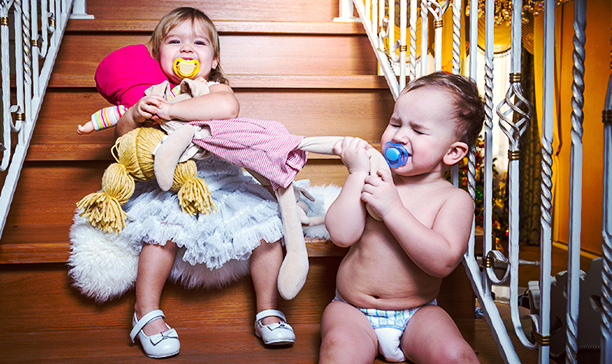
Toddlers that throw tantrums are not problem children or spoiled children, they are just normal kids struggling to cope with difficult emotions. If your child is throwing fits and embarrassing you in public, rest assured, they are not a brat, their frustrations are real and they are just expressing themselves the only way they know how.
Here are four things you can do to help the situation next time your toddler is throwing a tantrum:
1. Keep Your Emotions In-Check
The best thing that you can do when your child is having a temper tantrum is to stay calm. Do not try to distract your child from the temper tantrum, but do not remove yourself either.
According to Kids in the House expert, psychotherapist and author, Dr. Tina Payne Bryson, parents often unconsciously mirror their child’s emotions through something called mirror neurons. “So when our child is feeling out of control and full of rage, we start feeling that as well, because our nervous systems are captive and connected to one another.” Bryson says.
It is important to acknowledge your child’s emotional state in a way that does not escalate the situation. If parents are too calm, it can cause the child even more frustration. Bryson advises acknowledging your child’s emotions and mirroring them in a way that they feel heard but that also begins to diffuse a volatile situation: “If we’re just still totally peaceful and calm, it’s not going to work - it’s going to be a mismatch. But if we come right below them and say, “Oh, you’re so mad I’m feeling kind of frustrated too,” but a little bit lower than they, they can start coming down and we can start working together to calm down”
2. Understand the Benefits
As difficult as it may be to believe for anyone who has ever experienced a toddler meltdown, tantrums do have benefits.
Child psychiatrist and author Dr. Joshua Sparrow advises parents to view tantrums as a learning experience for kids. “Tantrums are really an opportunity for young children to begin to learn how to soothe themselves when they’re upset or distressed and that’s a really important skill that they’ll need for the rest of their lives,” Sparrow says.
Another benefit of tantrums is stress release. Our tears release cortisol, the stress hormone; which, if it stays in the body, can cause damage to internal organs and brain tissue. Releasing negative feelings and emotions is healthy and feels good, which is why most kids bounce back quickly after a tantrum.
3. Delay Punishment
When a child has a tantrum, they are experiencing a storm of emotion that they cannot control. Punishing them is only going to make it worse.
Family Psychologist, John Grienenberger, warns parents that threatening and/or punishing a child in the middle of a tantrum can escalate the situation. “Once the tantrum is started and once the child is past a certain point of upset, really the most important thing is to survive the tantrum, to help the child and to help you get through it without it leading to a bigger problem,” Grienenberger says. “That’s not the time to introduce something that’s going to be even more frustrating for your child. Wait until later if you need to add a consequence.”
4. Take Deep Breaths, Acknowledge Feelings and Be Patient
Supporting your child through a tantrum, often means being present, acknowledging their distress, but saying as little as possible, because, when they’re in that state of upset, they can’t hear you anyway.
Acknowledge their feelings by telling them that you see that they are upset and that you understand why: “You’re really upset because you can’t have the cookie.” Then wait for the storm to subside.
According to Kids in the House expert, parent educator and author Betsy Brown Braun, you have to let a tantrum run its course. “If your child has begun to have a tantrum, the train has left the station.” Braun says, “When you see your child start to come back to Earth, you can go down and swoop her up and give her a hug and walk away from it. Later, you can talk about it, “You were really upset. You didn’t like it when mommy said you couldn’t throw your toy and you had a big fuss. Didn’t work, did it? And now you’re just fine.”
For more expert tips on how to deal with toddler tantrums, check out kidsinthehouse.com.



























